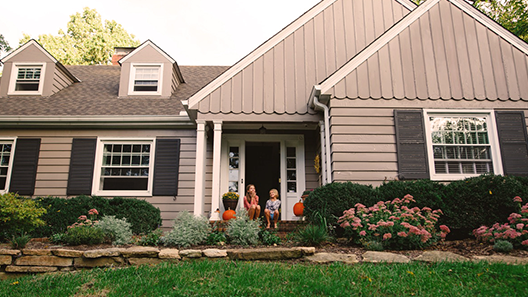When it comes to upgrading, redecorating, or adding to our homes, most of us don’t have a huge budget to pull from out of pocket. To make the changes we dream of, we have to find an avenue – the most common being credit cards or money loans, all with high APRs, annual percentage rates, meaning we’ll pay high-interest rates for any charges over time – not the best of ideas!

What Are My Options?
There are other options for responsible homeowners with mortgages, though – refinances†, including cash-out refinances. In this blog we’ll explore the pros and cons of multiple refinance avenues, breaking down their advantages over those high APR credit card and money loan alternatives.
Refinances
Refinances are new mortgages that replace the one before – usually with a lower interest rate. A refinance can save you money in the long term but may even cost money up front with fees associated with starting the loan. A refinance is a great idea if you’re looking to save money over time, especially if you can get a lower rate and monthly payment.
Cash-Out Refinances
In a cash-out refinance, you’re taking the base of a regular refinance, using a new mortgage to replace the first, but with a twist. In a cash-out refinance, the new loan is set at a larger amount than the original – this amount will be given to the homeowner as a lump sum to carry out their desires – be it improvements, paying off debts, or going on vacation. Cash-out refinances are considered the best option of all – as they allow you to plan ahead, offer varied amounts for what you need, and offer a lot of predictability as compared to other methods.
Newrez Home Equity Loan††
There is another option available to tap into your home’s equity to get the cash you need. Newrez Home Equity Loan is our new loan program built specifically for homeowners looking to tap the equity in their house without giving up their current mortgage. Keep your primary mortgage interest rate on your current loan when you secure a second mortgage. Just like a cash-out refinance, your money can be put toward home projects, renovations, debt consolidation, education costs, and more.
VA Streamlined Refinances
Exclusively for existing VA loan borrowers, this option offers benefits that make the refi process much faster to complete.
FHA Streamlined Refinances
This option is only for people who already have an FHA loan and comes with benefits that make the refinancing process go much faster.
Locking In an ARM (Adjustable-Rate Mortgage)
When you take on an ARM, known as an Adjustable-Rate Mortgage, your loan is susceptible to market ups and downs until you lock in the rate. You could save yourself in the long term by locking in the rate during a market low, or potentially at a time when markets indicate interest rates will rise. Alternatively, it may be time to refinance entirely to get out of being in an adjustable rate and instead lock in a refinance rate.
Terms You May See
While considering your options, it is easy to feel overwhelmed when it comes to terminology that will fly at you. Luckily, though, with a little reading, the terms you’ll likely see are fairly easy to understand. Below are a few of the most common.
Credit Score: A three-digit number that shows your history with money, credit, and investments. The number is based on your payment history, the amount you owe across loans and credit cards, how long you've had credit, and other elements.
For a breakdown of what goes into your credit score, see our blog here: What is the difference between my credit score and my credit report | Newrez
Debt-to-Income Ratio (DTI): The percentage you get when you divide your total monthly gross debts by your total monthly gross income. The percentage should be as low as possible.
For a breakdown of what goes into your DTI, see our blog here: DTI: More Important Than Your Credit Score? | Newrez
Closing Costs: Home financing fees are charged to the buyer or owner of a home when the loan is closed. Fees like the processing fee, the origination fee, the underwriting fee, and more, are all included. Some purchase contracts provide concessions for the seller paying these, otherwise, they are paid by the buyer.
For a breakdown of what goes into closing costs, see our blog here: The Top 6 Questions Homebuyers Have About Closing | Newrez
Loan-to-Value (LTV) Ratio: A percentage indicating what you owe on a mortgage compared to the current value of the home
For a breakdown of what goes into LTV, see our blog here: 13 Mortgage Terms You Need to Know | Newrez
What Option is Best for Me?
Covering off on the facts, it is true that a Cash-Out Refinance is often the best option for most homeowners looking to find some extra push in their budget. Laid out below are some examples of when a cash-out refi may make sense for you.
- High-interest debt is high on your priority calendar. Cash-out refinancing can help you pay off high-interest student loans or credit cards at a lower rate, among others.
- You want to renovate. Cash-out refinancing may be cheaper than personal loans for home improvements, and the interest may be tax-deductible.
- You want to invest. Some borrowers use cash-out refinancing to buy an investment property for passive income and wealth.
- Your credit score may rise after paying off student loans and credit cards. Your credit score is based on your credit usage and payment history, so it certainly makes sense to pay it down to improve your credit score for use in the future.
- You can adjust your loan terms during a cash-out refi, like changing from a variable to a fixed rate or from 15 to 30 years. Even 0.75 percent off your rate could save you thousands of dollars over the life of your loan.
- If you have good to excellent credit, mortgage rates are lower than personal loan rates.
Ready to explore your cash-out options? Give Newrez a call today to speak with a loan officer.



